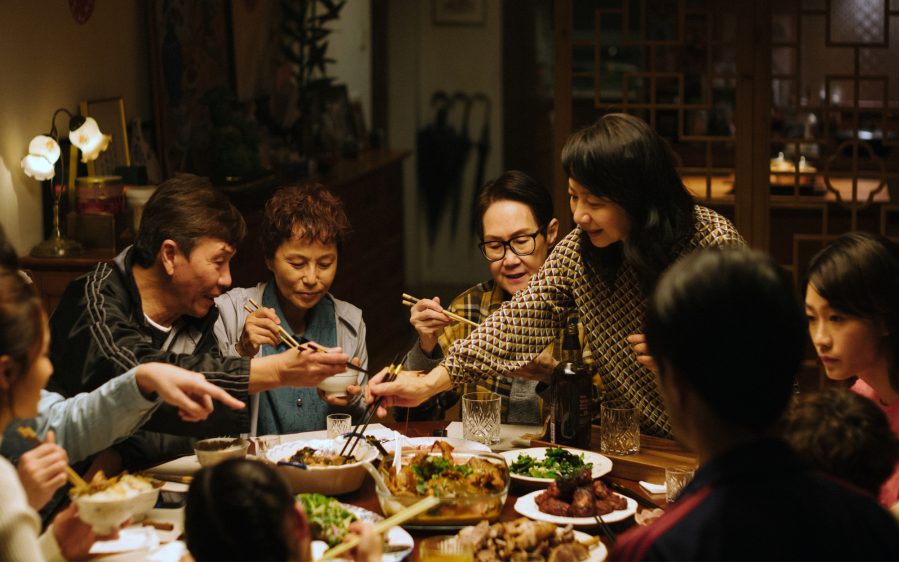Tender, Tentative Queer-Themed Grief Drama
With a title that itself feels like a soothing murmur, Hong Kong director Ray Yeung‘s “All Shall Be Well” returns to the social and lifestage milieu of his well-received 2019 later-life gay romance “Suk Suk,” and occupies a similarly melancholic, placatory register. But those hoping for a renewal, or maybe even an amping up of “Suk Suk”s restrained interrogation of internalized and externalized homophobia within Hong Kong’s economically advanced but culturally conservative middle class, may be a little disappointed. Although his fourth film revolves around a sixty-something lesbian couple, Yeung’s focus is broader, not sharper. The disappointment will however be mild, not just because there are plenty of other plaintive insights on offer, but because everything here is mild.
Angie (Patra Au Ga-man) and Pat (Maggie Li Lin-lin) have been a settled, loving couple for more than 40 years. They are now enjoying the simpler, slower pleasures of neighborhood life as older partners of such long standing that no one bats an eyelid at their non-traditional relationship. Pat, the more gregarious one, has cannily managed the finances from the textile factory they ran together, so that they are now comfortably off, living in the home she bought three decades prior. Pat has even been able, unbeknownst to Angie, to help out two other members of their small local lesbian community with a starter loan for their now-thriving florist shop. As they bustle through a companionable breakfast-time, Angie, the quieter, less practical one, gets frustrated sending a text through an unfamiliar messaging app. Pat shows her how with a couple of clicks.
They visit the market together, stocking up on the supplies for a family get-together they are hosting to celebrate the Mid-Autumn Festival. Actually, it’s all Pat’s family: her older brother Shing (Tai Bo), his wife Mei (Hui So Ying), their grown-up children Victor (Leung Chung Hang) and Fanny (Fish Liew Chi Yu), along with Fanny’s husband and two young kids. Far from there being any awkwardness, however, the extended brood descend on Pat and Angie’s in a cheerful clatter. The little kids call both older women “Grandma.” Fanny confides some of her worries about her husband’s lack of prospects with her “Aunty Angie.” And when Angie tries to press some cash on struggling Uber driver Victor, he gives it back, smiling ruefully and telling her that Pat got there first.
Most touchingly perhaps, there’s a special bond between Angie and Shing, her sorta-brother-in-law, who has had a couple of professional setbacks and now he and Mei are only just getting by. As they wave a convivial goodbye to everyone at the end of the night you can sense (not just from Yeung’s sensitive scriptwriting but from the mutually bolstering chemistry the two actresses share) that Pat and Angie, far from being the outcasts in this little tribe, are the lucky ones.
In a way, the portrayal of this gay later-life relationship as the most stable one within an ordinary Hong Kong family is its own kind of delightful subversion, and there would have been something oddly brave about simply sticking with this wonderful twosome, through the swells and lulls of their everyday routines. But Yeung has a lot of other social statements to broach in his careful, polite way, and so, soon after, Angie is fussing in the kitchen and calls out a question to Pat, who doesn’t answer.
Pat’s premature death throws Angie into an even quieter state, as though she has been winded. But agonizing grief is perhaps the most benevolent of the burdens she will have to shoulder. Pat died without a will and the pair were unwed (gay marriage still not being legal in Hong Kong). And so Shing, as Pat’s next of kin, not only gets to make decisions about his sister’s funeral, he stands to inherit everything she and Angie had shared, even their home. Though Angie can scarcely believe it, one by one the family she thought loved her as one of their own, turn — albeit apologetically — against her. And DP Leung Ming-kai’s fine cinematography, all softened edges and warm tones, becomes lucidly shallow-focused, separating Angie’s anguished face from the blur of a callous world.
Everyone, as Jean Renoir said, has their reasons. The rationale behind each cruelty is delicately evoked and domestic instability, Hong Kong’s cutthroat property market, and its paltry social support systems become the real villains. Which is all very even-keeled and level-headed, but, a little like with Veronica Lee’s insistently winsome score, the lack of inflection in the film’s infinitely broad-spectrum compassion can sometimes feel less like restraint and more like timidity. Anger is alien to Yeung’s style but it is sometimes justified, and without it, “All Shall Be Well” is a plea for understanding that should by now, by rights, be a demand.

